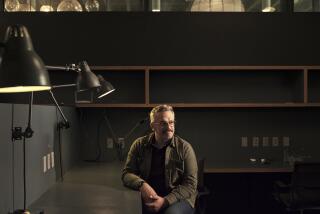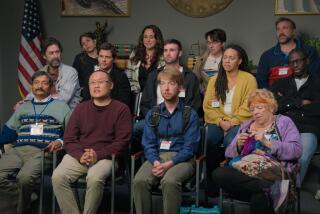‘Witnesses’ Add Reality to Legal Training
- Share via
The death of 84-year-old Helen Christie set off a pitched battle over the inheritance of her estate, all $400,000 worth.
Her only surviving relative, a niece named Margaret who didn’t get a cent, felt her aunt lacked the mental capacity to execute the will. As proof, she cited accounts from her aunt’s friend Zelda, who said Christie seemed to forget that she had willed the entire estate to a hospital just hours after she signed the document.
An interesting case, but the whole scenario is nothing more than a fictional case dreamed up by professors at the UCLA School of Law to help students gain experience handling real legal situations.
Community volunteers, after getting a dossier on the characters, play the parts of witnesses and principals and the law students spend an entire semester investigating every nuance of this and other imaginary cases.
Like their counterparts on the popular television series, the volunteers in this “Peoples Court” are given the dramatic license to cry, scream or do whatever it takes to simulate real witnesses and thus give students a chance to try out their legal and interpersonal skills.
“I have about 150 to 200 people from the community that have done this over the years and quite a few of them come from the Valley,” said Bunny Friedman, coordinator of the Volunteer Witness Program. “The volunteers get a little script to learn, which they are free to embellish according to their own personalities, but they must follow a basic fact pattern.”
Friedman cites another case in which a litigant sues his apartment complex after being mugged in the building’s lobby, alleging a malfunctioning security gate allowed the assailant to enter.
When the student lawyer interviews the litigant, all sorts of details come out--some supplied by the script, others added by the volunteer.
“The whole point is to act as if this really happened to them,” Friedman said.
The program, a part of several “clinical classes” offered at UCLA, includes mock trials before an actual Superior Court judge at the end of each semester with volunteers playing the parts of plaintiffs, defendants and the jury.
“Most everything we do is videotaped, that way we can go back and look at it with the professor and they can critique their techniques,” Friedman said.
The program is similar to ones offered medical students at UCLA and USC, where volunteer “patients” feign illnesses to help doctors-to-be practice making diagnoses, Friedman said.
The willingness of volunteers to help law students is apparent proof that anti-attorney sentiment is not universal, Friedman said.
“These are people who enjoy hamming it up,” Friedman said of the volunteers. “A lot of them are older people who just like to take part in the educational process.”
A few actors have even volunteered, Friedman said, including one who had a bit part in “When Harry Met Sally,” and a couple who appeared in the television series “Sisters.”
Friedman said the volunteers’ contributions are invaluable as they give law students experience that graduates of other programs lack.
“They get an understanding of how to put people at ease and how to deal with them on a human level, taking into account what the actual concerns are,” she said. “This is what we are trying to teach.”
Friedman said there is an educational aspect for the volunteers as well.
“It is a learning experience for them just to see how the process works,” she said. “But we always caution them that they can’t rely on what they are told by students. We always caution them to consult a professional.”
To become a volunteer witness, contact Friedman at (310) 206-1234.
More to Read
Sign up for Essential California
The most important California stories and recommendations in your inbox every morning.
You may occasionally receive promotional content from the Los Angeles Times.













